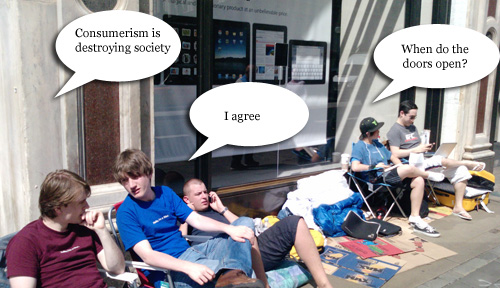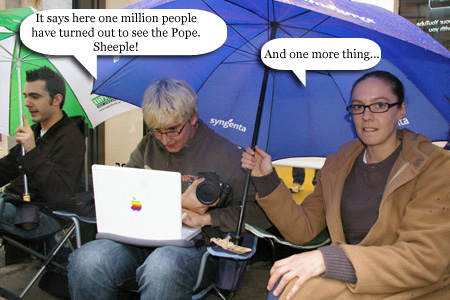
Steve Jobs was a remarkable and fascinating businessman, and by some distance the most interesting and accomplished personality operating in an important corner of the economy. He had a respect for the intelligence of human beings and their ambition, and potential – showing an optimism which is rare in a cynical industry. And Jobs left us far too early.
But we knew what was coming, didn’t we? In the media, a race to the top of Mount Hyperbole, that was easily won by Stephen Fry, with President Obama close behind. And public, showy and stagey displays of public emotion. (Why? Did no one tell you he was ill?).
I actually find all this disrespectful, and as distasteful as any sick joke.
Nobody could be more scathing about mindless technology worship than Steve Jobs. My favourite interview with him was by Gary Wolf, when Jobs was 39, and had realised the utopianism of his generation was shallow, empty and a giant diversion. The web would augment the world, not change it. Far more important, he stressed, was education.
“What’s wrong with education cannot be fixed with technology. No amount of technology will make a dent,” he said before explaining how to dismantle California’s public school system, and replace it with a system that looks very much like Free Schools.
And prophetically, he anticipated the “revolution” of user-generated content, blogs and tweets in this way:
“To be honest, most people who have something to say get published now.”

If Steve Jobs “changed your world”, then I have to ask – how big is your world, exactly? Perhaps it’s quite small.
As AN Wilson writes today, we need some perspective.
“Whereas we once looked information up in a book, we now search for the (often inaccurate) information online. Whereas we once sent telegrams, we now send emails,” writes Wilson. “Yes, Steve Jobs made shopping online easier and more attractive. But it is still only shopping.”
Many truly life-changing breakthroughs by scientists go uncelebrated, and in courageous defiance of institutions and conventional wisdom. But “boffins” don’t get lachrymose send-offs from strangers. Jobs was a significant figure, but no Nikola Tesla.
The late Norman Borlaug prevented a billion deaths by applying the scientific method to the traditional scattergun approach to crop selection and breeding, creating the “green revolution”. India used to have famines 40 years ago – now it exports grain. There are fewer conflicts in the world as a consequence. Women have more reproductive freedom. These are incredible achievements – and earned Borlaug the Nobel Peace Prize. But he received no such adulation, and even earned a few sneers in some obituaries.
What the Jobs hyperbole means is that your world is no bigger than your media. Or your computer. There can’t be a more tragic expression of the internet’s self-absorption.
I doubt if any computer or communications technology will have as far-reaching consequences as the work of Dr Craig Venter, another iconoclast, who in a decade will be producing oil and diesel that’s cheap, low-carbon, and renewable – much to the distress of the doom-mongers.
Capitalist iPigs
Two things occurred to me yesterday. Some of the most hyper-ventilating coverage came from parts of the media who spend the most time devoted to agonising about the evils of consumer capitalism, such as the BBC.
Isn’t it awful, they’re usually so keen to tell us, how capitalism encourages us to engage in an empty orgy of consumption? Aren’t these global brands terrible? No wonder there’s so much crime; big business just fuels materialism and envy. God, I hope it has at least a Retina display and 64GB of RAM.
rom which we have to deduce that consumption is evil, but only when it brings pleasure to the masses. Bourgeois consumer gadgets are really OK. They don’t count*.
Another strange thing is that the greatest Apple fans are the sneeriest about ordinary people observing religious rituals. Stephen Fry can wax eloquent about this at the drop of a voiceover paycheck. But what is Apple’s release cycle if not a ritual? What was Fry’s toe-curling visit to Cupertino, other than the act of a devotee seeking to have his faith affirmed?
We didn’t call it the Jesus Phone for nothing.
Some people who noisily self-identify as supremely rational seem to delight in using this to indicate their moral superiority to the pleb – or pilgrim – on the bus sitting next to them. Maybe it just covers some other insecurity. But if they then indulge in utterly irrational behaviour, that claim to superiority is no longer valid.
Let’s remember Jobs for what he achieved. He’d be the first to agree that there are more important things in the world than media devices, and he made that case very eloquently. ®
Bootnote
*Your reporter has owned, in succession, five G4 Cubes – I’m guilty as charged. It’s hypocrisy I can’t stand.

0 responses to “Steve Jobs and Dianamania revisited”